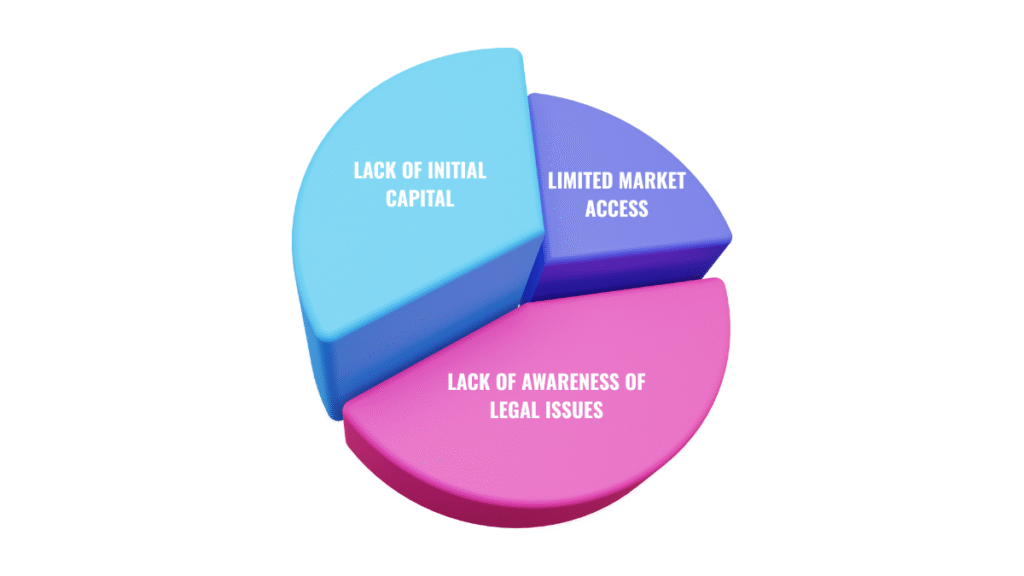In the modern world, innovation and invention are recognized as key drivers of economic growth and technological advancement. According to a World Bank report, in the 1980s, around 500,000 patents were registered annually. However, today, based on the report from the World Intellectual Property Organization (WIPO), more than 3.5 million patent applications are filed globally each year, indicating a significant increase in innovative activities. This growth is driven by rising global investments in research and development (R&D).
Nevertheless, more than 60% of startups that operate without the support of accelerators fail within their first five years. In contrast, startups that receive support from innovation centers and accelerators have a 75% higher chance of success. According to a UNESCO report, in 2022, over 2.4% of the global Gross Domestic Product (GDP) was spent on research and innovation. Furthermore, the digitalization of industrial processes and advancements in cutting-edge technologies in fields such as healthcare, transportation, communications, and energy have accelerated the pace of innovation.
History of Industrial Innovations
Industrial innovations have always been a fundamental pillar in the transformation of human societies. A historical review shows that four industrial revolutions have shaped the course of human progress:
- The First Industrial Revolution (18th century): The use of steam power and mechanization of industries led to increased production and economic restructuring.
- The Second Industrial Revolution (late 19th century): The emergence of electricity and the development of mass production accelerated economic growth and enabled the expansion of industrial networks.
- The Third Industrial Revolution (20th century): The advent of information technology, the development of computers, and the internet led to the digitalization of the economy.
- The Fourth Industrial Revolution (present day): The rise of artificial intelligence (AI), the Internet of Things (IoT), blockchain, biotechnology, and advanced technologies has created new pathways for innovation.
The Role of Accelerators in Global Innovation
An analysis of the growth trends of successful startups in various countries shows that nations such as the United States, China, Germany, and Japan have built strong startup ecosystems through extensive investments in innovation centers. For example, in the United States, renowned accelerators like Y Combinator, Techstars, and 500 Startups attract billions of dollars in funding annually. According to a Stanford report, 70% of startups that have participated in these programs have achieved sustainable growth within five years. In China, government-backed accelerators such as TusStar and Zhongguancun InnoWay have played a significant role in fostering tech startups, leading the country to over 1.5 million new patent registrations in 2023.
Innovation Analysis Across Continents
- North America: The United States and Canada are global leaders in innovation. The U.S., with over 300 active accelerators, is one of the most important hubs for startup development. Canada, with initiatives like MaRS Discovery District and Creative Destruction Lab, also plays a crucial role in advancing new technologies.
- Europe: Countries such as Germany, the United Kingdom, and France have made significant investments in innovation. In Germany, the Fraunhofer Society, the largest applied research organization in Europe, has had a major impact on the development of new technologies.
- Asia: China, Japan, and South Korea are among the leading countries in innovation. China, with over 200 innovation centers and extensive government investments, has one of the fastest-growing tech sectors. Japan, through government support for startups and smart technologies, is recognized as a global hub for research and development.
- Africa: In recent years, Africa has seen rapid growth in innovation. Countries like Nigeria, Kenya, and South Africa have established innovation centers and specialized accelerators to support startup development. For example, iHub in Kenya is one of the most successful incubators for tech entrepreneurs in Africa.
- Australia & Oceania: Australia is emerging as a key innovation center. The government, through programs such as CSIRO and investments in advanced technologies, has successfully doubled the number of patent registrations over the past decade.
Advantages of Accelerators and Innovation Centers in the Success of Inventions
- Financial Support and Investment Attraction
One of the main challenges for inventors and startups is securing sufficient funding for idea development and commercialization. Accelerators and innovation centers provide initial capital and facilitate connections with venture capitalists, enabling sustainable growth for innovators. Many inventions would not reach the market without this financial support. Additionally, these centers create crowdfunding platforms, allowing small investors to participate. Renowned accelerators such as Y Combinator and Techstars have successfully supported major companies like Airbnb and Dropbox.
- Technical and Business Consultation
Beyond funding, innovators need technical and business knowledge. Accelerators offer access to experienced mentors and educational programs, teaching inventors the technical skills and commercialization strategies necessary for market success. These consultations help transform creative ideas into competitive products. Workshops on product design, market analysis, and pricing strategy are among the essential services these centers provide. Early-stage companies like Uber and Stripe benefited from these services and achieved significant success.
- Networking Opportunities
One of the biggest advantages of innovation centers is the ability to build extensive connections with other innovators, industry leaders, and investors. These interactions lead to strategic collaborations and resource sharing, ultimately increasing the chances of invention success. Specifically, international networks established by some accelerators allow innovators to access global markets. Many startups in Silicon Valley have attracted major clients and investors through such networks.
- Workspaces and Essential Infrastructure
Another key advantage of accelerators is the provision of office spaces, research labs, and specialized equipment for startups. These resources significantly reduce initial costs and create an environment conducive to collaboration and knowledge exchange. For instance, some Silicon Valley innovation centers provide not only workspace but also access to cutting-edge technologies such as Artificial Intelligence (AI) and the Internet of Things (IoT).
- Business and Entrepreneurial Skill Development
Accelerators focus not only on product development but also offer programs to teach management skills, investor negotiation tactics, and financial management. These skills are essential for startup founders to survive in a competitive market. Many accelerators conduct intensive business management and leadership training programs.
- Increased Market Success and Survival Rates
Statistics show that startups that participate in accelerator programs have a higher survival rate compared to those that do not. This success is attributed to access to financial resources, expert consultations, and extensive networking opportunities provided by accelerators. Additionally, many accelerators collaborate with large corporations, creating new partnership and market expansion opportunities for startups.
- Faster Commercialization Process
The commercialization of an invention is often a long and complex process. Accelerators streamline this journey by providing essential infrastructure and effective strategies. Many successful companies today have shortened their time-to-market through innovation centers. Key offerings include shared workspaces, laboratory facilities, and prototype production centers. Innovation hubs like MIT Innovation Initiative have successfully accelerated the growth of tech startups by offering essential resources and support.
Challenges Faced by Inventors and Solutions Provided by Accelerators

- Lack of Initial Capital
Many innovators lack sufficient financial resources. Accelerators solve this issue to a great extent by providing initial investment and enabling access to investors. Without adequate capital, many inventors are unable to turn their ideas into reality. This issue is especially critical in industries such as advanced technology and biotechnology, where research and development costs are high. Accelerators not only provide initial funding but also connect startups to a network of interested investors through investment sessions. This process helps them overcome the critical early stages and enter the development phase.
- Limited Market Access
Many inventions cannot reach the global market without support. Accelerators facilitate market entry by creating communication networks and establishing strategic partnerships. For instance, the startup Spotify benefited from Swedish innovation centers’ support and managed to transform the digital music market. One of the main problems for startups is the lack of market awareness. Many inventors don’t know how to properly present their product or find the right market for it. Accelerators create opportunities for startups to connect with large companies, ensuring that innovative products are more likely to be accepted in the market. In some cases, these centers help facilitate market entry by signing cooperation and partnership agreements.
- Lack of Awareness of Legal Issues
The patent registration and intellectual property protection process is complex. Innovation centers provide legal consultation to assist innovators in this regard. For example, the accelerator Techstars holds programs to educate startups on intellectual property rights, helping them protect their inventions and innovations. Protecting intellectual property is critical for inventors because, in many cases, without legal protection, innovative ideas may be copied or used without permission by competitors. Accelerators help startups understand the patent registration process, trademark registration, and trade secret protection by offering specialized training and legal consultations. Additionally, some accelerators collaborate with experienced lawyers to provide services like handling legal disputes and guiding startups through the process of drafting legal contracts.
Comparison of the Role of Accelerators in Different Industries
- Medical Technology: Companies like Moderna and Illumina have leveraged accelerator support to develop cutting-edge medical technologies. In the medical field, accelerators help innovative ideas move quickly through research and development stages and reach production. By providing funding and access to advanced laboratory facilities, these centers play a crucial role in the development of vaccines, new drugs, and medical equipment.
- Artificial Intelligence: Startups like OpenAI and DeepMind have grown and achieved significant success with the help of accelerators. Specialized accelerators in this field provide access to powerful computational infrastructure and large datasets for startups. This allows researchers and innovators to improve AI models faster and provide new solutions in areas such as natural language processing and computer vision.
- Renewable Energy: Companies like Tesla and SolarCity have been able to bring sustainable technologies to market with the support of innovation centers. In this industry, accelerators facilitate connections with governments and large energy companies, enabling startups to receive financial support and expand their market reach. These centers also help optimize clean energy production and distribution processes, playing a significant role in reducing dependence on fossil fuels.
- Financial Technology (Fintech): Startups like Stripe and Revolut have introduced innovative solutions in digital payments and online banking with accelerator support. In this industry, accelerators help startups by connecting them with banks and financial institutions, enabling them to obtain necessary licenses and gain customer trust. They also provide technological infrastructure and expert consulting to ease the entry into international markets.
- Transportation and Logistics: Companies like Uber and Zipline have introduced new models for transportation and goods delivery with the help of accelerators. In this field, accelerators assist startups in optimizing transportation routes and developing technologies such as artificial intelligence and the Internet of Things (IoT), which increases efficiency. This support has led to reduced transportation costs and improved customer experiences.
- Agriculture and Biotechnology: Startups like Indigo Agriculture and Plenty have created more sustainable and efficient farming methods with the support of accelerators. These accelerators support startups in developing advanced technologies like hydroponic farming, plant genetic modification, and smart agriculture systems. These innovations help increase agricultural productivity and reduce the use of natural resources.
- Education and Learning Technologies: Startups like Coursera and Udemy have developed innovative educational platforms with accelerator support. In this field, accelerators contribute to the development of online education and digital learning by offering initial investment, expert consultation, and access to international markets. These supports have led to rapid growth in educational technologies and increased access to learning resources worldwide.
- Digital Games and Entertainment: Companies like Epic Games and Roblox have developed large gaming and entertainment platforms with accelerator support. In this industry, accelerators help startups by providing funding, game development technologies, and marketing strategies, enabling them to launch their games in global markets and enhance user experiences.
- Space and Aerospace Industry: Startups like SpaceX and Rocket Lab have introduced important innovations in the space industry with the support of innovation centers and accelerators. These accelerators provide funding, facilitate collaboration with government agencies, and offer research infrastructure, helping space startups develop new technologies for space launches, satellites, and interplanetary exploration.
- Tourism and Hospitality: Startups like Airbnb and Booking.com have introduced new models for accommodation and travel with accelerator support. In this field, accelerators help tourism startups by offering marketing advice, optimizing customer experience, and attracting investors. This support allows them to offer innovative services in hotel bookings, smart travel, and local experiences.
Conclusion
Accelerators and innovation centers play an irreplaceable role in accelerating the growth and success of inventions. These centers assist startups by providing financial resources, research infrastructure, specialized consultancy, and networking opportunities, helping them overcome initial obstacles and reach the commercialization stage. Global studies show that countries investing more in innovation and acceleration centers have been able to play a more pivotal role in advancing high-tech production. Additionally, the impact of these centers is evident in various industries, including medical technology, artificial intelligence, renewable energy, and transportation.
Given global trends, it is expected that accelerators will become more specialized in the coming decade, and virtual and international acceleration programs will experience significant growth. Moreover, collaboration between accelerators and governments will lead to an increase in technological innovations and sustainable economic growth globally.
Ultimately, innovators and entrepreneurs can maximize the opportunities available by utilizing the support from these centers and, with the knowledge, experience, and capital provided, achieve faster growth and long-term success. The growing importance of accelerators indicates that the future of innovation and technological development will, more than ever, depend on these centers.






